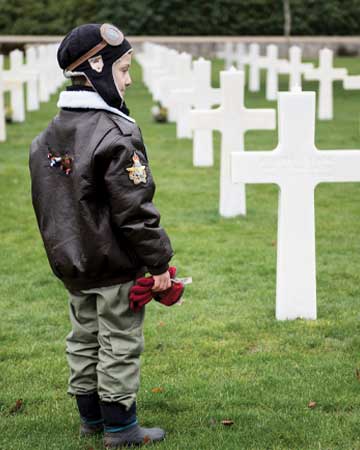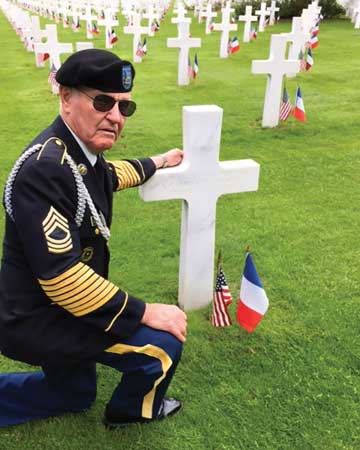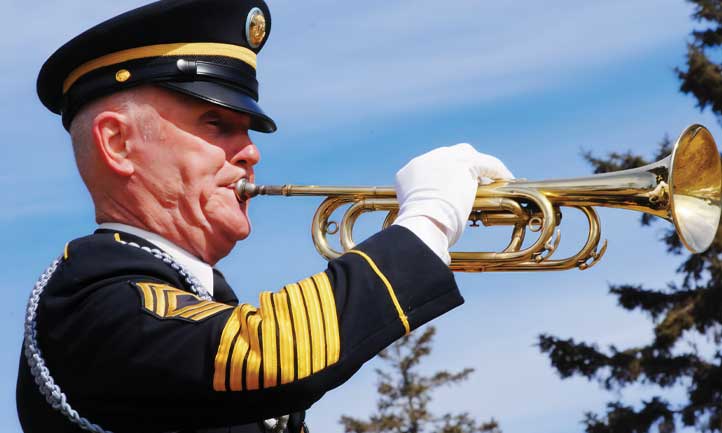A Lonely Cross
Author: Peter Duston
Carrying on the Names and Stories Behind the Stones
Cherryfield, Maine: The fourth-grade class in Cherryfield, Maine — a small coastal town of 1,900 where I live — has been making an annual pilgrimage to one of our small cemeteries for over 20 years — a tradition started by WWII Veteran Joe Sproul, who would share with the children the background of those buried there from the Revolutionary War to the present, including brothers killed in the Civil War who left behind a grieving mother to mourn over their empty grave. Inside the cemetery is an unknown Civil War grave marked only by a rusted Grand Army of the Republic (GAR) flag holder as our community tries to keep his memory and the memory of those he represents alive. We understand that it will be up to our children to remember, honor, and carry on the responsibility.
Each year in Cherryfield — with the help of scouts, school children, and volunteers — we place over 400 American flags on graves for Memorial Day and another 400-plus wreaths during the holiday season. We instruct participants to say the veteran’s name as they place flags or wreaths and ask the scouts to salute. Watching an 8-year-old Cub Scout salute a hero he never knew is heartwarming, but this particular May, our town’s fourth grade teacher shared that — after placing the Memorial Day flags, with no prompting — a 10-year-old student gathered the teachers and students in a circle and asked for prayers for those buried below and those above them.

For our small-town Memorial Day program, we gather at the bandstand with the Cherryfield Band playing the national anthem and close with the attendees singing “God Bless America.” Our scouts hand out serviceable grave flags with a 3x5 card listing the name and details of a veteran in our 20-plus cemeteries. During “Calling the Role,” we ask that each individual among the crowd of 80-plus attendees hold up their flag and read the veteran’s name and story so they are not forgotten. It’s a very powerful reminder to attendees of all ages that freedom is not free and continuing to say the names of the fallen is the responsibility of each generation. Our scouts then lead a march down Main Street where the flower girls toss their homemade bouquets into our tidal river for those lost at sea and at the Civil War monument in the larger Pine Grove Cemetery for those killed on land, both to the tune of taps.
Iconic Battlefields
In 2018, my wife and I visited the U.S. military cemetery on the bluff overlooking Utah Beach on the Normandy coast where the D-Day invasion took place June 6, 1944, 80 years ago this year. I brought my beat-up Boy Scout bugle with the goal of playing taps in that sacred place. There were tour buses, a huge car park, hundreds of visitors, and no quiet or personal place for me to play as the cemetery prepared for the D-Day remembrance ceremony.
Wanting to escape the crowds, I followed the walkway to the farthest end of the cemetery, passing row upon row of white crosses and a few Stars of David — each bearing witness to the soldier buried in that sacred ground. The crosses were arranged to end on a single lonely cross at the apex of that remote section, “Known but to God.”
I was alone with that unknown soldier — no other visitors in sight. I took a deep breath, breathed a solemn prayer, and stood at bugler's attention to play the very best taps I could muster. This unknown’s grave was the farthest from the main memorial, so I figured he never got to hear taps where he lay during the various memorial programs over the years. As I meditated in that shaded glen, I experienced a feeling of awe, reminding me that freedom is not free. I also reflected on who this unknown was as a son, a brother, a grandson, and the grief his family would have experienced when receiving a regretful letter from the War Department. I know from researching these losses that the families often received no closure, just the vague promise that, someday, the remains of their loved one may be recovered.


Hidden Memorials
As a bugler, I often ponder the memory of Gerry Scott, my childhood trumpet teacher who taught me taps when I was a 12-year-old Boy Scout so I could sew on the patch as “Troop Bugler.” Gerry deployed to Korea in 1951 and went missing that bitter winter when the Chinese overran his unit. He never came home, and his family still waits. Gerry never had taps over his lonely grave.
Years ago, my wife and I visited South Korea. With the help of our friends and three Republic of Korea Army officers, we used old battle maps to locate the exact spot of Gerry’s capture. I brought a POW medal and small American and MIA flags, and we held a memorial service for Gerry, burying the medal in an old fighting position. I didn’t bring my bugle on this trip, so we played Arlington National Cemetery taps from an iPhone.
I never knew Gerry’s family, but an article I wrote for his hometown newspaper connected me to his brother and his family. They were moved that Gerry was not forgotten as I told them that I often think of Gerry when sound taps at a military honors funeral. At 85, I still play taps and fold flags with military honor guards here in Maine. It’s an honor to stand as an anonymous sentinel at a funeral and sound those solemn 24 notes for the survivors — expressing thanks from a grateful nation. As a scout leader, I still wear my 1950 Bugler patch and teach scouts pursuing the Bugling merit badge.
Over the years, as photos fade, names are forgotten, stories dissolve with generations, and memories dim, these Soldiers, Sailors, Airmen, and Marines are lost again. It’s up to us — whether in our own small towns, standing on the hallowed ground we read about in history books, or memorializing quiet, unsuspecting pieces of foreign land that bore witness to last breaths. We must carry their legacies, say their names, and keep their memories alive.

Share Your Story
Honoring fallen heroes is such an important part of the TAPS mission. Be sure to add your loved one to our Grateful Nation Memorial Wall, and share their story with us. We would love to consider your writing for publication on our blog or in future issues of this magazine.
1LT Peter Duston, U.S. Army Retired | Bugler, Maine State Honor Guard
Photos: Peter Duston, DVIDS and TAPS Archives
